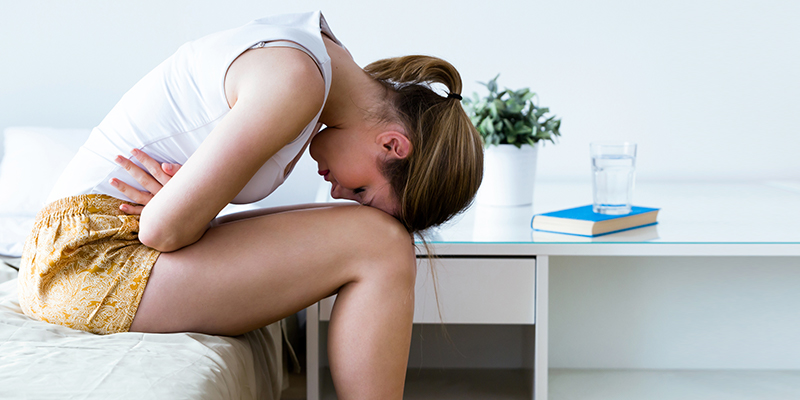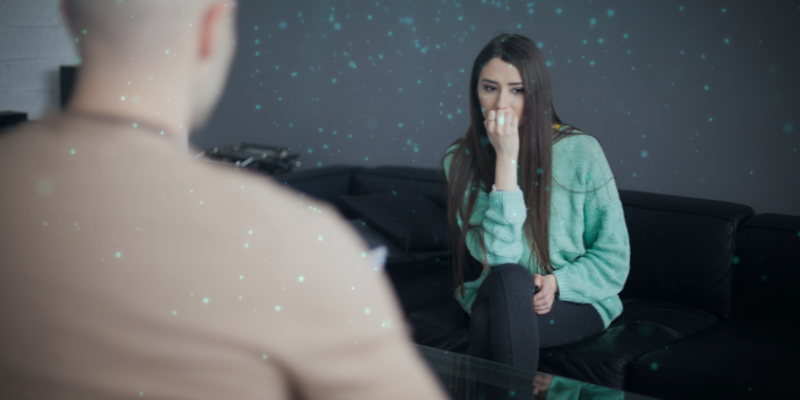
Headaches, a queasy stomach, muscle pain—is it time to reach for the aspirin or ibuprofen? Or is it anxiety or depression causing your symptoms?
Anxiety and depression are best known for causing mental distress—making you feel nervous, worried, sad, or numb. But these common psychiatric conditions—anxiety affects an estimated 40 million Americans and depression hits approximately 17 million—are also associated with a host of physical symptoms.
According to Amen Clinics, a global leader in brain health that has treated tens of thousands of people with mental health issues over the past 30 years, here are 5 of the most common physical symptoms of anxiety and depression.
According to Amen Clinics, here are 5 of the most common physical symptoms of anxiety and depression. Click To Tweet5 COMMON PHYSICAL SYMPTOMS OF ANXIETY AND DEPRESSION
1. Headaches
Research has found that headaches are common in people with depression or anxiety, especially in people with a generalized anxiety disorder or panic disorder. Some people experience tension headaches that can cause mild to moderate pain and may involve stiffness in the neck and shoulders. Others suffer from migraines, which are associated with more severe pain and can interfere with daily activities. A 2018 study in the journal Headache found that people with frequent migraines are more likely to experience anxiety and/or depression.
2. Muscle tension, soreness, or chronic pain
Muscle tension is often seen in people with anxiety or panic disorder, and chronic pain is frequently seen in depressed people. Research in the Journal of the Neurological Sciences shows that people with depression tend to have a lower tolerance for pain. At Amen Clinics, brain SPECT imaging studies show that people who experience chronic pain often have too much activity in an area of the brain called the thalamus, which is part of the limbic system (the emotional centers). On SPECT, overactivity in the limbic system is often associated with depression.
People with depression tend to have a lower tolerance for pain. Click To Tweet3. Nausea, upset stomach, digestive distress
Everyone knows that anxiety about a big life event can trigger a nervous stomach, but the connection between the digestive tract and mental health goes even deeper. Feeling nauseous, having stomach cramps, or experiencing constipation or diarrhea are all associated with anxiety and/or depression. Findings from a 2016 study appearing in Advanced Biomedical Research showed that people with irritable bowel syndrome (IBS) have higher anxiety and depression symptoms compared with people who don’t have IBS. And a 2011 study found that people with anxiety or mood disorders were more likely to have constipation compared with the general population.
4. Fatigue or lack of energy
When you have anxiety, you may worry incessantly, which can be exhausting. But the fatigue you feel may also be related to sleep troubles. Anxious thoughts may make it difficult to fall asleep or may cause you to wake up in the middle of the night when worries start spinning in your mind. Research in Dialogues in Clinical Neuroscience shows that about 75% of people with depression also have insomnia, and other scientific evidence reveals that over half of the people with anxiety have trouble sleeping. A smaller percentage of people with depression sleep more than usual, but still feel daytime sleepiness. If you aren’t sleeping well, get an evaluation before taking sleeping pills, which may be hard to stop.
5. Chest pain or rapid heartbeat
During a panic attack, it is common to suddenly feel your heart start racing or tightness in the chest. This usually resolves after the panic attack subsides. In people with depression, chest pain can become chronic. Research shows that people with cardiovascular disease are more likely to suffer from depression, and on the flip side, people with depression or anxiety are at a greater risk of developing heart disease. Because of this, if you experience chest pain, it’s very important to see a doctor to check it out.
WHAT TO DO WHEN PHYSICAL SYMPTOMS PERSIST
You may not realize that the recurring aches and pains, digestive issues, or fatigue you experience are related to mental health problems. Many people simply head to their primary care physician or another traditional medical professional in an effort to treat the physical issues without considering the possibility of underlying anxiety and/or depression. Getting to the root of the problem is the key to feeling better.
Always remember that your brain, body, and mind are interconnected. Notice when your physical symptoms arise. Is it during times of increased stress, nervousness, or sadness? Becoming aware of an increase in pain, more frequent headaches, or an uptick in digestive problems or other physical symptoms may be a clue that anxiety or depression may be rising and that it’s time to seek professional help.
Always remember that your brain, body, and mind are interconnected. Click To TweetAnxiety, depression, and other mental health issues can’t wait. During these uncertain times, your mental well-being is more important than ever and waiting until life gets back to “normal” is likely to make your symptoms worsen over time.
At Amen Clinics, we’re here for you. We offer in-clinic brain scanning and appointments, as well as mental telehealth, remote clinical evaluations, and video therapy for adults, children, and couples. Find out more by speaking to a specialist today at 888-288-9834. If all our specialists are busy helping others, you can also schedule a time to talk.





Excellent.
Excellent. Thank you.
Comment by Pamela Erickson — September 4, 2020 @ 3:31 AM
Can I leave my job if I have severe anxiety and depression
Comment by Carmel McLean — September 4, 2020 @ 3:57 AM
The brain/body/emotions are absolutely interconnected. Amen Clinics are spot on with their wealth of resources. Sadly, we are still in the stone age regarding mental/spiritual health here in the 21st century! In the U.S., if someone seeks psychiatric help, they are immediately hijacked into the world of Big Pharma, extremely toxic drugs, and often end up suffering serious side effects, accidents, suicide, or death. Amen Clinics is one of the few available resources in the U.S. that offers a pathway to actual healing & health. Dr. Amen’s work shines a light in the darkness & tyranny of Medical/Big Pharma fascism that is ‘The Mark’ of the world today.
Comment by Sterling — September 4, 2020 @ 6:11 AM
I struggle with anxiety, ever since I had a hysterectomy many years ago. Most of the symptoms here apply to me. Panic attacks less than they use to be , but alot of heart palpitations. I take a beta blocker for that. Any advice would be appreciated, as this is an ongoing issue for me. Thank you..
Comment by Kathleen Kennedy — September 4, 2020 @ 7:32 AM
Is tinnitus a common depression symptom? Mine came on recently as an incessant hi frequency tone. I’m 70 and in good health aside from anxiety and depression.
Comment by Lauren — September 4, 2020 @ 9:52 AM
I have dabilatating oops anxiety, panic attacks, ocd and have schizoeffective since I’m 19 . I’m doing ok but got hit with every physical and mental symptoms of anxiety. I was unbearable any I am on 3 one mg of Ativan it sure calmed it down a lot but still experiencing a lot off muscle pain and tension in my neck. What’s the best remedy for muscle pain was prescribed muscle relaxer did not work real well. What do you suggest? Ty
Comment by Joanne Cruz — September 4, 2020 @ 10:37 AM
Depression and anxiety are insidious often masked by the symptoms discussed in this article. I have been a caretaker for 3 family members with a terminal illness and eventual death since 2017. I had a stroke last year and continue to care for my husband, who has cancer, as I write this post. I have developed all of the symptoms described in this article. I got through the tumultuous years with work, counseling, positive self talk and the support of friends/family. As a healthcare professional in mental health, I know the stigma of being diagnosed with depression, a label that prevents many folks from seeking the proper care. This is very sad since one wouldn’t think twice about getting treatment for diabetes. I am a firm believer in trying to do all that can be done without medication but there are times when pharmacological treatment is necessary.
Comment by Kathleen Pattee — September 6, 2020 @ 5:55 AM
Does the anxiety or depression cause the digestive or other symptoms or can those symptoms/problems cause the anxiety/depression? I have narcolepsy and am inflammatory to many foods and if I eat them I have digestive symptoms. It is not easy to live in a structured world and have issues that limit my ability to function in the box society expects everyone to function in. I don’t have anxiety or depression. However, it is not easy to live with chronic illnesses that limit my ability to work a full time job, drive long distances, or eat lots of regular everyday foods. It can be disappointing to not eat what others are eating or foods I used to enjoy. It is also sometimes difficult and frustrating to constantly organize my life around my sleep schedule and my food limitations. I’m blessed that most people around me are understanding and I have the means to make all the necessary adjustments. It would be a greater blessing if society at large and employers were understanding. I do my best to manage everything and keep a healthy perspective, however sometimes I feel if my circumstances weren’t as they are, I don’t know how I could manage it all without becoming overwhelmed with anxiety and/or depression.
Comment by Renee — September 6, 2020 @ 4:35 PM
I had no idea that anxiety could cause a person to feel nauseous and they could also experience muscle pain. My friend told me that she’s having bouts of this lately, along with negative thoughts. I’ll recommend this to her so that she’d consider trying out anxiety therapy.
Comment by Zachary Tomlinson — September 10, 2020 @ 7:35 AM